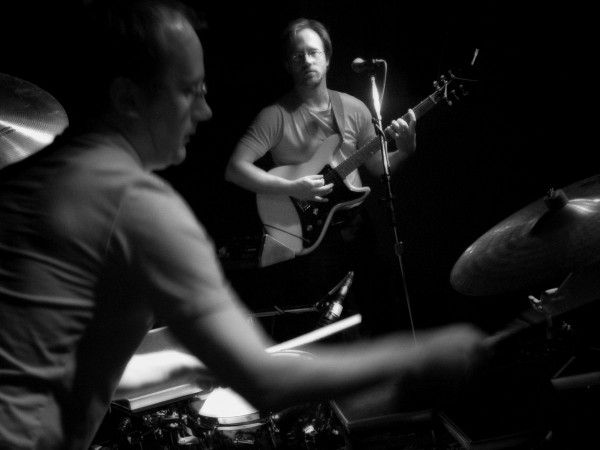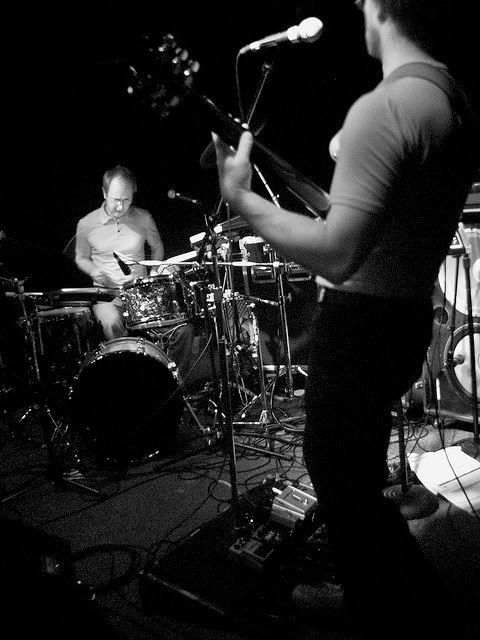Shuttlecock
Настоящее имя: Shuttlecock
Об исполнителе:
Shuttlecock began in Toledo, Ohio, in early 1998, as a collaboration between band members Kenneth Chojnacki and John Hubbell after returning from a European tour with their previous band, Omaha (initially known as Colossus of the Fall). Omaha was comprised of Kenneth Chojnacki on guitar, Andy Lietner on bass, John Hubbell on drums and Dirk Hemsath on vocals and guitar. The band had released almost all their recordings on singer Hemsath's record label, the seminal, Doghouse Records. Suffering from band infighting and Hemsath's preoccupation with Doghouse Records and his purchase of Lumberjack Distribution, the demise of Omaha was imminent. Chojnacki and Hubbell soon began to write music under the new moniker, Shuttlecock. The beginnings of the band were tenuous, at best, and the pair employed Lietner on bass, by default. As a trio, the group released two recordings. The first offering was a 7" titled "Report" (a reference to the sound of an explosive noise). Released by Atomic Action Records in 1998, "Report" was recorded in Chicago, IL at Electrical Audio, Studio B with engineer and friend, Bob Weston at the control board. The record documented two songs, "Cocksure" and "32 Degrees". This first 7" was a rock influenced experiment with minimalist undertones that saw the trio exploring the use of odd time signatures and stop start arrangements. In 1999, released under Chojnacki's own, Iron Compass Records label, the band's second offering was titled, "This is the Hour of Lead". Recorded in Chicago, IL at Uber Studio, Shuttlecock once again employed Bob Weston to engineer the recording. "This is the Hour of Lead" contained six songs, the first three were part of a suite of songs about gunfighters of the west. Copper Press called it, "A soundtrack to an old western showdown". "This is the Hour of Lead" found the band continuing to explore odd time signatures, stop start arrangements and complex song structures. As reviewer Keith Bergman observed, "Shuttlecock write songs like little Swiss clocks, full of mysterious whirring gears, miraculous subtle and tiny parts intricately, efficiently and unstoppably pulling their weight, clocking something as simultaneously simple and impassively gigantic as time itself." Two other songs were recorded during the sessions which were never released. One of the songs was a rendition of The Smiths, "oscillate wildly" which the band performed live on occasion. A very short tour followed the release of the record which ended with lietner's resignation. Shortly before lietner's departure the band recorded another two song 7" that was never released. After a short hiatus, Chojnacki and Hubbell, reorganized their efforts. Opting to disregard a search for a replacement for lietner, the duo alternately decided to incorporate new instruments and new sounds into the musical equation. Bass duties were now split by Chojnacki, performing parts with a set of Crumar electronic bass pedals and Hubbell, performing other parts with a basic set of Simmons electronic drum triggers. With the inclusion of these electronic elements and the addition of Chojnacki now playing a Travis Bean guitar, the sound of the band changed dramatically. And, in 2002, the result was a new recording titled, "Machine-Extended". Once again released on Chojnacki's own Iron Compass Records label, the nine song, "Machine-Extended" was recorded at The Odum, in Chicago, IL with Bob Weston engineering the sessions. While the "Machine-Extended" era found the band struggling with a new paradigm, the raw, minimalist and powerful nature of the recording revealed hints of what the band was capable of achieving. Bizarre and gritty, "Machine-Extended" can be best characterized by a cryptic and detached bridging of electronic and organic, of precision and aggression, and of science and the interpersonal, such as in the album closer “Theorem”. In 2003 the potential of Shuttlecock revealed itself fully with the release of the group's four song EP titled, "Existing Bridges". The EP was recorded by Bob Weston at Bill Skibbe's studio in Benton Harbor, MI., called, Key Club Recorders. Released by Friction Records, this recording marked a more flushed out collection of instrumentation and process. Chojnacki now employed a more powerful and flexible set of Moog Taurus II pedals and Hubbell had designed and built an extensive rack of Simmons Synth brains which were patched into custom switching devices. With a more flexible set-up the band's efforts were now more focused. The album's opener, "Propulsion", is the epitome of the driving, experimental ferocity and intense precision with which the band approached it's material, under the new circumstances. As reviewer Bill Mahoney described it, "Shuttlecock is relentless in their experimentations, avoiding conventional song structures like they were diseased, and coming up with songs that are breathtaking for those with an insatiable taste for the musically unpredictable". The "Existing-Bridges" era also marked an active and busy performance schedule for the duo. During live performances the band was known for it's intensity, precision and frequent improvisation. In fact, it is confirmed that the duo considered any deviation from the original song to be an opportunity to improvise. Most notably, the band was known to make calls to friends during performances. The recipient of the call was instructed before hand to say or scream what ever came to mind and the result would be amplified through the guitar's pick-ups. Because Chojnacki and Hubbell performed and recorded all the music without the aid of computers or sequencers the onstage set-up was quite unorthodox. Witnessing the band in the live performance setting was the best way to understand their modus operandi. And, as a reaction to this, the following quote began to appear on the record sleeves, "There is no use of any type of modern sampler, sequencer, or midi device on this recording or during any live performance, for that matter". Reviewer Jonathon Winters notes: "I can hardly believe it. How can two people make all of this electro-racket without a little pre-recorded or over-dubbed cheating? In an age when the laptop has become the rock instrument of choice, these guys opt instead to juggle their instruments like tennis balls and slap them silly on the way down. Just try doing that with a Powerbook." Busy performing, working on new material, separated by distance (Chojnacki had moved out of state) and unsure as to who would release the next record, the band decided to slow it's pace for 2004. In 2005 Action Driver Records agreed to release a new Shuttlecock recording. Tired of rising costs, small budgets, and interested in trying a new approach, the duo decided to record with Kevin Ratterman at his studio in Louisville, Kentucky called The Funeral Home (actual funeral home). Entering the studio with a couple of written songs, a handful of loose ideas and a some lyrics, the band intended to create more of a live feeling by incorporating a fair amount of improvisation in to the recording process. The end result was the nine song, "Simulation Assimilation". The album's strongest track, "Bombardier", exemplifies the brittle, bombastic and biting turns the music had taken for this final record. A short time after the recording was finished and sent off for production, the pair received word that Action Driver Records was going out of business and would not be releasing the record. Still busy performing, working on new material and separated by more distance (Chojnacki had moved out of the country) the band eventually self released "Simulation Assimilation" in late 2006. In late 2007, as a result of growing familial pressures, financial concerns and musical differences, Chojnacki and Hubbell agreed to play a final set of shows and then part ways. Shuttlecock played it's final show on March 28, 2008.


